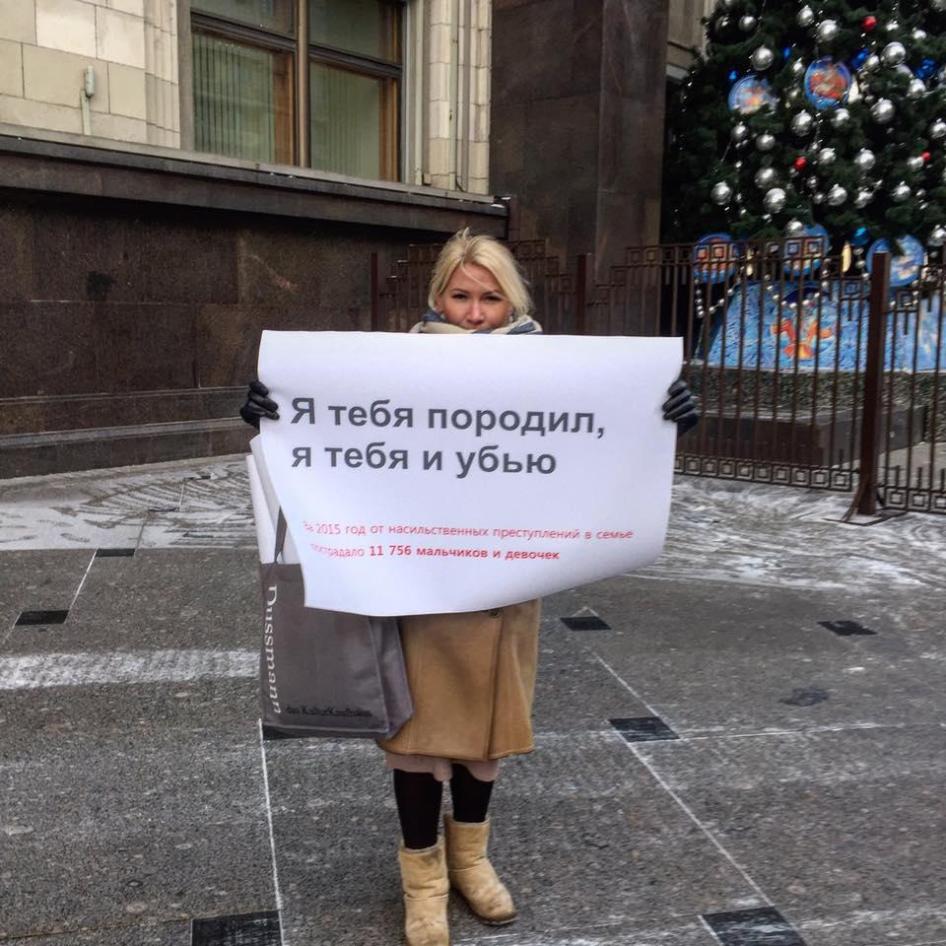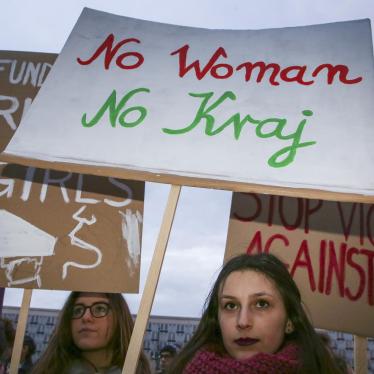Update: On February 7, 2017, President Putin signed the bill into law.
On February 1, 2017, the upper chamber of the Russian parliament adopted the amendments.
On January 27, the lower chamber of the Russian parliament adopted the amendments decriminalizing a first offense of family violence.
(Moscow) – A draft law pending in Russia’s parliament would seriously weaken protections against domestic violence, Human Rights Watch said today. Parliament should reject the law as dangerous and incompatible with Russia’s international human rights obligations.
“Passage of this law would be a huge step backward for Russia, where victims of domestic violence already face enormous obstacles to getting help or justice,” said Yulia Gorbunova, Russia researcher at Human Rights Watch. “The domestic violence bill would reduce penalties for abusers and put victims’ lives at even greater risk.”
The amendments would decriminalize a first offense of family violence that does not cause serious harm requiring hospital treatment. Only violence that leads to serious injuries like broken bones or a concussion would remain criminalized. The law would apply to violence against any family member, including women and children. Abusers, if found guilty, would face a minimal fine, up to 15 days’ administrative arrest, or compulsory community service.
The draft law is scheduled for a second reading in parliament on
January 25, 2017.
The proposed law contrasts starkly with recent steps to confront domestic violence in Russia. In July 2016, parliament
adopted amendments criminalizing violence against one’s relatives. Some members contended then that it would have a negative impact on “traditional family values.” The politically influential leadership of the Russian Orthodox Church criticized the law as
lacking “moral justification and legal grounds.”
Senator Yelena Mizulina, who led a failed attempt to halt the 2016 amendments, said
publicly she believes women “don’t take offense when they see a man beat his wife” and that “a man beating his wife is less offensive than when a woman humiliates a man.” Mizulina also said that Russian law should support family traditions that are “built on the authority of the parents’ power,” and that parents should be allowed to hit their children.
Mizulina and others introduced the bill to reverse the July 2016 law.
“Contending that beating a relative is a manifestation of ‘family values’ is shameful,” Gorbunova said. “Victims are the ones who need protection, not the abusers.”
Russian
women’s rights activists had campaigned for many years for a comprehensive domestic violence law, which stalled in parliament since 2014.
Official statistics show that around 40 percent of all violent crimes in Russia
are committed within the family. Independent research shows the problem to be even more serious. One study in 2013 found more than
80 percent of violent crimes against women in Russia are committed by spouses or intimate partners. Up to 36,000 women and 26,000 children
face violence in the family every day.
In a
2011 study of 30,000 women in 60 Russian regions, 38 percent of women said they had been subjected to psychological violence, while every fifth respondent said that they had been subjected to physical violence by their husbands or partners. In a 2005 study of 2,200 people in 50 towns and cities across Russia,
70 percent of women said they had been subjected to at least one form of violence – physical, sexual, economic, or psychological – by their husbands, and 36 percent experienced both physical and psychological violence.
The Russian government
has regularly failed to effectively prevent domestic violence and ensure justice for victims. Officials routinely do not investigate or even respond to domestic violence allegations, and shelter spaces for victims are very limited. Moscow has fewer than 150 shelter spaces for a population of over 12 million.
Failure to adequately protect victims of domestic violence and ensure access to justice violates Russia’s international human rights obligations. Russia is a party to the Convention on the Elimination of All Forms of Discrimination against Women (CEDAW), which prohibits violence against women, whether in public or in private, and establishes such violence as a form of discrimination. In a 2015 review of Russia, the CEDAW committee noted “the high prevalence of violence against women” and criticized the absence of legislation to prevent and address violence against women, including domestic violence.
Russia is also party to the Convention on the Rights of the Child, which prohibits violence against children, including in the family. In a 2014 review of Russia, the UN Committee on the Rights of the Child urged Russia to prioritize the elimination of all forms of violence against children and prohibit all forms of corporal punishment, including in the home.
“The proposed legislation is a massive setback to efforts to eradicate domestic violence, domestically and internationally,” Gorbunova said. “Rather than weakening existing laws, Russia should adopt tougher ones to prevent domestic violence, protect victims, and hold abusers to account.”









